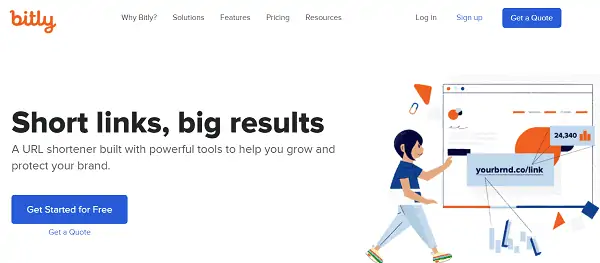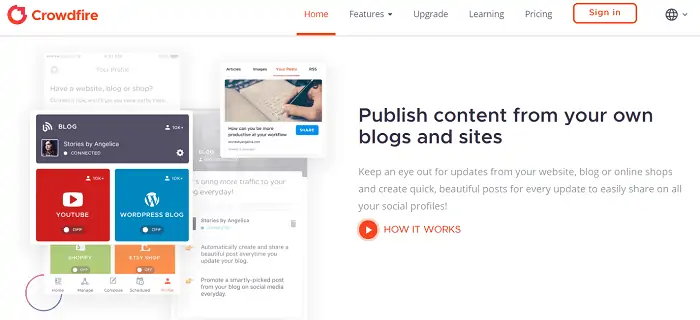
Are you looking for the best blogging tools to simplify your writing and marketing operations? If so, you’ve reached the right page.
A blog is an ideal place to share your knowledge and make money. You can share the little things you know in a way that everyone can understand. What if it helps you build a career and establish your own identity?
But before writing, you have to look at whether there will be readers for the subject. Firstly, analyze current search trends to discover low-competitive keywords that can bring more content traffic in a short period. Then, prepare qualitative blog posts to maximize their reachability and traffic.
Once the content is published, update it with search engines and social sites to improve your page visits. Track users to find your target audience and top referral channels to customize your marketing strategies. But you can’t do all these things manually. For that, you should use the right blogging tools.
Today, we’re going to list 15 essential blogging tools that help you to create and manage blogs easily.
Table of Contents
Essential Blogging Tools 2024
Blogging is not a simple thing. From starting a blog to marketing the content and analyzing the traffic, you should do several things to get the desired result. Along with perseverance and hard work, you will also need proper blogging tools to reach the heights.
If you are just started a blog or trying to improve traffic to the existing blog, use them to produce high-quality content, monetize, and market them among the enthusiasts.
Let’s take a look at some of the best blogging tools on the web,
1. WordPress

A platform is essential to create and run blogs. Recently, we covered a detailed post about the best free blogging sites to launch a website without any investment. If you have not read it, here’s the link: Best Free Blog Sites to Start Blogging (2024 Edition)- Pros and Cons.
WordPress is the most popular platform in this category. It is free and highly customizable. There are thousands of WordPress themes available in free and premium categories to build any kind of website. They allow you to customize layouts, from the header to the footer, in simple steps.
Anyone can handle a WordPress website with basic internet knowledge. The plugin functionality is the main feature of this platform. You will get plugins for almost any purpose like security, backup, social sharing, SEO, and others. The reason why famous brands and news websites work on the WordPress platform is no other.
2. Semrush

Semrush is our favorite tool to discover profitable keywords, optimize content, and analyze competitors. It can tell you what keywords can bring the most traffic to your pages and how to use them to prepare SEO-friendly content.
Enrich your blog post with relevant keywords and explore new backlink opportunities to rank higher in search engine results. It can do many things to establish your blogging identity and skyrocket organic traffic.
Semrush can also schedule and share your content on leading social media channels to bring more page visits. They have a free subscription plan with limited functionalities. Read our in-depth Semrush Review to find how it helps you to generate unlimited blog post ideas and explore new growth opportunities.
If you want to explore its various features without any restrictions, click this exclusive link to activate a 14-day free trial on Semrush.
3. Todoist

Once you selected the topic, add it to your to-do list. Todoist is one of the best free blogging tools to create blogging projects and get reminded in time. It lets you organize lists under different heads which you can keep track of and monitor from any device with the app installed.
Todoist a great choice to improve your productivity and ensure everything is on the right track. Assign tasks to co-authors and give instructions to finish projects within the stipulated time. This app automatically syncs todos to keep you updated about pending and upcoming tasks.
4. Grammarly

Grammarly is another essential tool for bloggers. It will automatically check your content and let you know about spelling mistakes, grammatical errors, etc.
Google Chrome users can install the browser extension to identify mistakes on the go and fix them at the earliest. Grammarly is the perfect companion for bloggers to improve their writing skills and develop high-quality content.
5. Google Docs

Google Docs allows you to create blog posts online, share and collaborate with other authors to edit or collect feedback. Guest authors can easily share their content with the website owner through Google Docs and make modifications before publishing.
It also allows you to create and edit office documents, spreadsheets, presentations without installing any software. It has dedicated apps for Android and iOS devices. So you can access the files anywhere on the go.
6. Google Search Console

Google Search Console is another essential tool for bloggers. After publishing the blog, create a webmaster account for it. Submit your individual posts as they publish and update XML Sitemaps at regular intervals. It helps the search engine to better understand your blog.
Monitor your traffic and identify what keywords work best for you. Optimize relevant posts to improve their ranking and bring more traffic. Google Search Console can also track your page performance and ensure that they load smoothly on all device types.
7. Bitly

Bitly is a powerful service to monitor the growth of your campaigns and user clicks. It will replace your long ugly URLs with short links that will give a professional look to your social media shares.
There are several social media plugins that let you integrate sharing with URL shortener tools like Bitly. It will provide in-depth statistics of your links including the number of clicks, traffic channels, etc. Analyze those details to find out the best time for posting and boost your traffic.
8. Ahrefs

Ahrefs is a great tool for keyword research, backlink analysis, and SEO audit. It is free for your own website projects. Claim your ownership first, through any of the recommended methods like Google Search Console integration, DNS records, HTML tags, or HTML file upload.
Once the connection is successfully established, start tracking organic keywords and backlinks for all your websites. Track ranking positions and update content frequently to get more visits from search results.
9. Facebook

Social networking sites can bring massive instant traffic to your blog. Facebook is the main marketing place to promote products and content. Create a business page to build a strong network around your blog and share updates.
Facebook groups can divert massive traffic to your pages. Join blogging communities to meet niche enthusiasts and share links at peak times. It will help you to get more user clicks and page visits.
10. Google Analytics

Google Analytics is a great tool to track your blog visitors in real-time. It provides details such as user locations, their device types, traffic sources, and much more. Identify what pages they are landing in and how long they spend on them. Monitor your page performance and ensure that they load fast on various devices.
It can also help you to detect the most popular posts on your blog. Prepare similar category posts and interlink them to reduce your bounce rate and boost traffic. Google Analytics can track almost anything on your blog like digital downloads, forms, eCommerce sales, and many others.
11. Moosend

Moosend is a free email marketing service that you can use to connect with regular readers. Send post notifications, exclusive offers, and other updates to your fans by email to get regular traffic to your pages.
Schedule newsletters at peak time and use reports to analyze click rates and re-schedule your upcoming campaigns. Moosend is free for up to 1000 subscribers with built-in templates and lead generation tools. Mailchimp, Get Response, Aweber, and Active Campaign are other similar tools in the category.
12. ShortPixel

Images are essential parts of a blog post. But you should optimize them properly. Otherwise, they will consume huge storage space on your server and also cause slow speed issues.
ShortPixel is a free image optimization plugin for WordPress. It is easy to use and automatically optimize images on upload. It compresses images with multiple algorithms to reduce their size and serve them with or without a lightning-fast CDN.
The plugin helps you to improve page speed through image lazy loading, WebP support, and CDN integration. ShortPixel is free for up to 100 images per month. Read The 7 Best WordPress Image Optimizer Plugins Compared.
13. Google AdSense
Money-making blogging is another part we are interested in. Google AdSense is one of the best blogging tools to monetize content at least for beginners. Display AdSense ads in the different parts of your blog to get a guaranteed monthly income.
Just insert your ad slot code via theme settings or plugins and you are ready to go. Visitors will see ads based on their browsing history and keywords you used in the posts. AdSense is a reliable solution to monetize your blog and earn money.
14. Crowdfire

Crowdfire is a free social media marketing tool for bloggers. It supports some major social networks to schedule and monitor content. Free users can share posts on Facebook, LinkedIn, and Instagram with up to 3 accounts.
Crowdfire allows you to curate content from your own blogs, eCommerce shops, and YouTube channels to share them on connected networks. It also has a Chrome extension to schedule content from anywhere on the blog to build relations and boost your social media followers.
15. pCloud

pCloud is another best blogging tool every blogger should use. It is a popular, free cloud storage provider to store any kind of files such as documents, images, and videos.
The basic 10 GB storage is free and you can extend the limits using one of their subscription plans- yearly or lifetime. Their lifetime plans cost just $175 for 500 GB of storage and $350 for 2 TB of storage. It is affordable for all budget types.
How many of you are using these blogging tools? Feel free to share your feedback through the comment form below.
Read How to Create Epic Blog Posts That Attracts Repeat Readers



